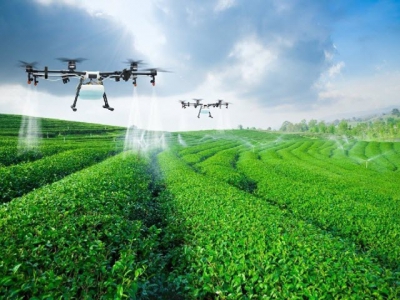Digital transformation key driver for agriculture

The digital transformation is being considered the key to unlock sustainable development of livestock for the country, with large-scale breeding farms investing more in digital farming.
Technology has played a huge part in discovery, prevention, and control of diseases, especially with the complex movements of African swine fever (ASF). In the southern province of Dong Nai, local authorities have decided to implement Te-Food’s blockchain-based traceability and livestock management system with integrated epidemic control module to tackle outbreaks of ASF.
All pig farms in Dong Nai will have to register on Te-Food’s mobile app and provide regular reports about livestock status. They can report suspected illnesses, and the veterinary authority can assess the reports. If an outbreak is confirmed, the authority can order the culling of livestock.
Controlling and monitoring the movement of animals is crucial during an epidemic. Animal transport will be required to be registered, and state veterinarians will issue electronic passports for the transports, identified by QR codes, which makes enforcement easy at roadside checkpoints.
Dao Ha Trung, chairman of the Ho Chi Minh City Hi-tech Association and chairman of Te-Food International, said that ASF has a high rate of infection, while it takes at least a few years to study a vaccine. “Thus, it is necessary to have comprehensive, long-term, and radical solutions in preventing it, and one of the current effective solutions is the application of high technology,” Trung said.
Along with the role of seeking the origin and controlling diseases, technology is also applied in many other areas in the livestock sector such as automating cages, temperature regulation systems, and preserving livestock products.
In the opinion of scientists, in the poultry sector in particular, application of technology is concentrated in three areas: developing breeds, automating process of breeding and nutrition. As a result, technology helps farmers to guide the poultry industry more accurately.
As smart livestock becomes inevitable, many animal breeding companies in Vietnam are highly aware that bolstering high-tech and digital solutions has become a strategic path towards an effective and sustainable agriculture sector.
C.P. Vietnam is one example, with the Thai group creating clear policies to focus on technological innovation.
“Many of our facilities have been automated to eliminate human error and other missteps. The group is now developing a chicken facility in the southern province of Binh Phuoc,” said Montri Suwanposri, president of C.P. Vietnam.
C.P. Vietnam has been developing standards, making its work easier and more accurate. “At this stage, we are working on accurate data and applying automation in farming. What the group has been already successful with is a traceability system that allows customers to track C.P. products from upstream to downstream easily,” Suwanposri added.
At Mavin Group, it has identified high technology as key to producing clean, safe, and traceable products for customers. “We are implementing a digital transformation towards 2023, with the goal of making the company the most innovative digital agriculture corporation in Vietnam,” said David John Whitehead, chairman of the group.
Agriculture 4.0 models in Vietnam remain modest and spontaneous, concentrating only on some but not all stages, and domestic companies still lack capital to invest in equipment. In seeking to control diseases, large farms have been interested in traceability for pigs, while small-scale farmers are more negligent.
Many farmers are still afraid to declare information about breeding, and thus a parallel support policy is needed to encourage farmers’ honest declaration in herd statistics via apps.
Besides this, it is necessary to build synchronised digital transformation system. Dinh Tien Thanh, general director of Intimex Vietnam, said that in the supermarket chain, there has yet to be manufacturer barcodes on their raw products. Supermarkets have to create the barcodes themselves to manage their goods.
Above all, says Whitehead of Mavin Group, planners and governments need to ensure that digital infrastructure facilities for large data bandwidth are completed. Government support policies are also needed to invest in agriculture, especially during periods of low product prices.
According to Ho Tu Bao, scientific director at the John von Neumann Institute of the Vietnam National University in Ho Chi Minh City, businesses need to follow six steps in digital transformation.
“First is awareness and changing mindset about digital transformation, followed by defining roadmaps, building digital capacity in human resources and infrastructure, identifying key technology, adapting operation models, and adjusting organisation from small to large,” Bao said.
Related news
 Industry calls for national technical regulation for raw cashew
Industry calls for national technical regulation for raw cashew The Việt Nam Cashew Association wants the Ministry of Agriculture and Rural Development to draft national technical regulations for raw cashew nuts
 Exports of cassava starch to face hurdles this year
Exports of cassava starch to face hurdles this year It is expected that throughout 2020, China will continue making adjustments to the Value Added Tax for cassava starch that are imported through official channel
 182 rice traders certified as eligible for rice exports
182 rice traders certified as eligible for rice exports The Ministry of Industry and Trade has granted 47 certificates of eligibility to rice export businesses over the past year, lifting the number of rice exporters